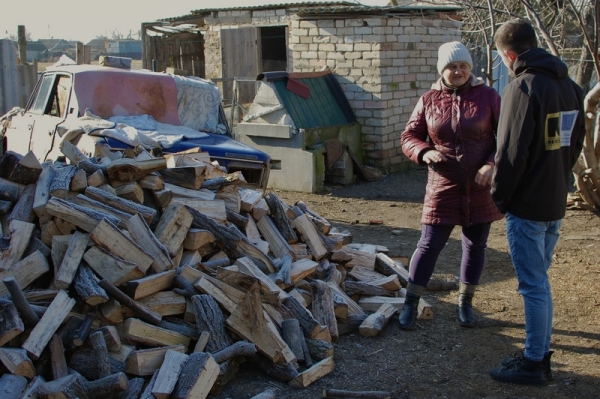EU billions for Ukraine means life or death for village mayor
EU leaders gathering in Brussels will wrangle over €50bn in aid for Ukraine. For some, it is a question of politics and last-minute concessions for Hungary’s prime minister Viktor Orban and his bid to derail the money.
But in Pravdyne, a village 27km from the front line in south-eastern Ukraine, it is a matter of life or death. "We need this to live," Liubov Shevchenko, Pravdyne’s mayor told EUobserver on Wednesday (31 January) of the pending EU aid.
-

"We need this to live," says Liubov Shevchenko, Pravdyne’s mayor (Photo: EUobserver)
"It is really important for us, without money, we have no hope. Our needs are too great," she said.
It is unclear if the flurry of diplomatic efforts in Brussels to change Orban’s mind will work, ahead of Thursday’s summit as EU defence ministers announced their promise to deliver 1 million rounds to Ukraine.
The munitions announcement comes at a critical moment.
On Wednesday, Ukraine said it shot down 14 Shahed-136/131 drones and on Tuesday, it said Russia had launched 35 including two S-300 missiles, in what appears to be a typical day.
But a typical day also comes with a renewed Russian offensive ahead of sham presidential elections in March that will see president Vladimir Putin retain his grip on power.
Earlier this week, Lieutenant General Kyrylo Budanov, Ukraine’s chief of defence intelligence, announced the anticipated Russian offensive in Ukraine was already underway.
And Ukraine has also accused Russia of carrying out chemical attacks, following five strikes using likely K-51 grenades carrying chloropicrin, a World War I era poison gas.
Any such attacks are likely to spread fear among those who have already endured and lived under the onslaught of Russian forces.
Cluster bombs, mines and murder
Pravdyne is one of them. Russia’s nine-month occupation of the village came with its own set of horrors; cluster bombs, mines and murder.
During the siege, the Russians shot dead seven villagers. In an effort to conceal the crime, they then hid the bodies in a house and blew it up, says the Kherson regional prosecutor’s office.
Shevchenko prefers not to talk about it. In her small office, heated with a wood fire stove burner, she’s too busy organising the distribution of food and water to the remaining villagers.
More than a dozen or so had gathered outside the small administrative building. The sound of Russian ballistic missiles likely fired from Crimea could be heard roaring overhead.
And the hundreds of small white flags fluttering in the wind in fields surrounding the village was another reminder of Russia’s war footprint. The flags were placed as part of a mine sweeping and de-mining operation.
"Do not be afraid if you hear explosions," said Shevchenko.
Mines aside, the greatest needs span from dealing with people’s mental health, illnesses, getting a water station, and to rebuilding the shattered lives of villagers, she said.
Before the war, Pravdyne had a population of around 1,500. Today, there are around 800. But when it was liberated in November 2022, only 180 remained.
Among them was 42-year-old Svietlana Supruk. Born in Pravdyne, Svietlana remains terrified of any Russian return having lived through the entire nine-month occupation.
Her husband had been hit by a cluster munition next to the fence in the garden. He survived. But their neighbour lost a hand and another person was killed down the road, she said.
On Tuesday, they celebrated 26 years of marriage together. "I want peace. And peace again," she said.
But Pravdyne is also in desperate need of jobs, says 58-year-old Yulia Mordieva, another local.
"It is too difficult to live without any help, without any assistance. If we could work, it would be less difficult," she said, standing next to a large pile of firewood behind her house.
The wood was purchased through a cash-assistance programme run by the International Rescue Committee to help people through the winter months. Around 1,200 other households in the Kherson region have also been helped.
"This assistance was aimed at helping them secure solid fuel, cover utility expenses, and more during the winter season," says the IRC.
The International Rescue Committee/ECHO is reimbursing travel expenses for EUobserver’s trip through Ukraine.

